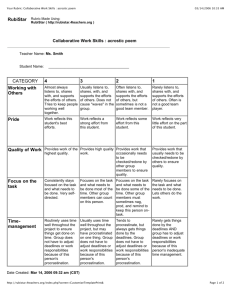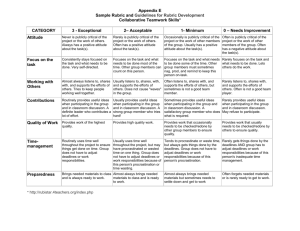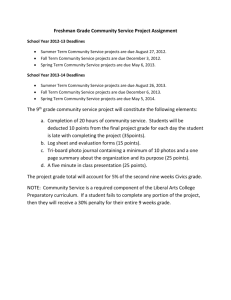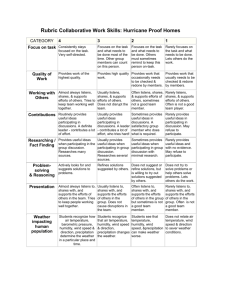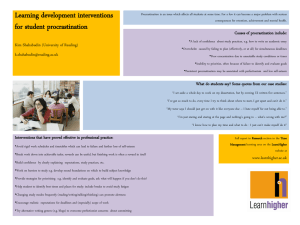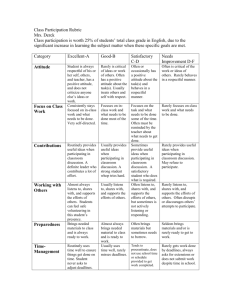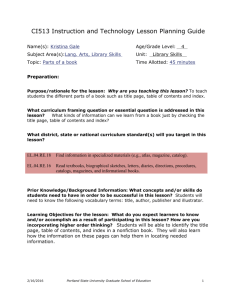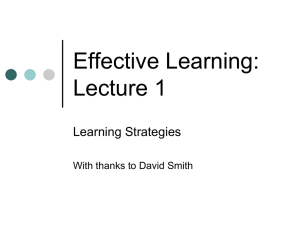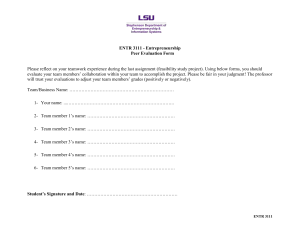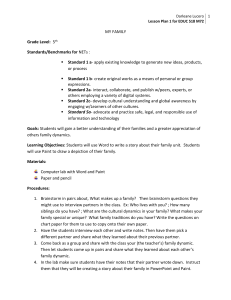Middle School Music Lesson Plans
advertisement
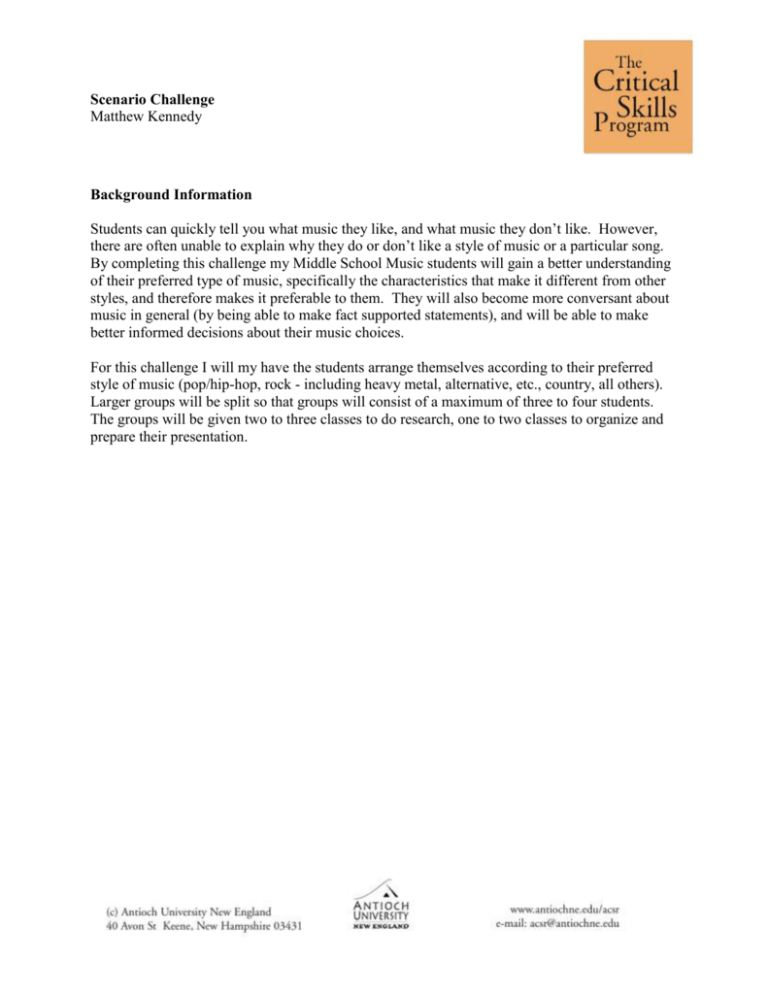
Scenario Challenge Matthew Kennedy Background Information Students can quickly tell you what music they like, and what music they don’t like. However, there are often unable to explain why they do or don’t like a style of music or a particular song. By completing this challenge my Middle School Music students will gain a better understanding of their preferred type of music, specifically the characteristics that make it different from other styles, and therefore makes it preferable to them. They will also become more conversant about music in general (by being able to make fact supported statements), and will be able to make better informed decisions about their music choices. For this challenge I will my have the students arrange themselves according to their preferred style of music (pop/hip-hop, rock - including heavy metal, alternative, etc., country, all others). Larger groups will be split so that groups will consist of a maximum of three to four students. The groups will be given two to three classes to do research, one to two classes to organize and prepare their presentation. Information for Students A new radio station is being built in town, and the owners need help in determining the format (of songs to play). Because our students possess such an extensive knowledge of music, they have hired us as a consulting firm to make presentations on some of the more popular styles of music, and why each one should be chosen as the format for the station. Each group will be responsible for researching their style of music and doing a presentation that convinces the listeners (of the presentation) to select their style for the new station. A radio representative(s) from local radio station(s) also will be available for limited consultation during your research, and will also be present to observe the presentations and provide feedback. In addition to the group presentation, each member of the group will need to do an individual presentation on why a particular artist (or group) is a good example of the style of music presented by the group, and why that artist should be featured on the new station. The way each group and individual chooses to do their presentation is up to them. Group presentations need to explain, in terms of the elements of music as discussed in class, what makes that style of music distinctive. The presentation also needs contain evidence, relevant to the nature of what makes Popular Music popular, that supports the argument to make your style of music the format for the new station. Individual presentations need to explain, in terms of the elements of music as discussed in class, what makes your chosen artist a good representative of the style of music presented by the group. It also needs to contain evidence, relevant to the nature of what makes Popular Music popular, that supports your argument to feature them on the new station. If your group’s style is chosen as the format for the new station, each member will be given a bonus of $10 for each hour they spent working on both the group’s and their individual presentation. In order to qualify for the bonus, however, each person must submit a log of the hours spent working. The log will need to include the following: 1) a breakdown of the date and beginning and ending time for each work session 2) an indication of whether a work session was spent working on the group presentation versus the individual presentation 3) what was accomplished during each work session Also, the individual whose artist is chosen to be featured on the new station will be given two (free) passes to any concerts promoted on the station for the first year. Assessment Since I will be doing this some time into the class, and after the Academic Challenge, I will take the Checklist Assessment for the Academic Challenge, modified it (partly based on the classes review of the checklist after completing the Academic Challenge), and using the http://rubistar.4teachers.org web site I turned it into the following Rubric: CATEGORY Contributions Working with Others Focus on the task Timemanagement Resources 4 Routinely provides useful ideas when participating in the group and in classroom discussion and who contributes a lot of effort. 3 Usually provides useful ideas when participating in the group and in classroom discussion. A strong group member who tries hard! Almost always listens to, shares with, and supports the efforts of others. Tries to keep people working well together. Consistently stays focused on the task and what needs to be done. Very selfdirected. Usually listens to, shares, with, and supports the efforts of others. Does not cause "waves" in the group. Routinely uses time well throughout the project to ensure things get done on time. Group does not have to adjust deadlines or work responsibilities because of this person's procrastination. Uses a large variety of accurate supportive materials form a large range of sources. Usually uses time well throughout the project, but may have procrastinated on one thing. Group does not have to adjust deadlines or work responsibilities because of this person's procrastination. Uses a small variety of accurate supportive materials form a small range of sources. Focuses on the task and what needs to be done most of the time. Other group members can count on this person. 2 Sometimes provides useful ideas when participating in the group and in classroom discussion. A satisfactory group member who does what is required. Often listens to, shares with, and supports the efforts of others, but sometimes is not a good team member. 1 Rarely provides useful ideas when participating in the group and in classroom discussion. May refuse to participate. Focuses on the task and what needs to be done some of the time. Other group members must sometimes nag, prod, and remind to keep this person on-task. Tends to procrastinate, but always gets things done by the deadlines. Group does not have to adjust deadlines or work responsibilities because of this person's procrastination. Rarely focuses on the task and what needs to be done. Lets others do the work. Uses a very limited variety of mostly accurate supportive materials form a very limited rage of sources. Uses a very limited variety of mostly inaccurate supportive materials form a very limited rage of sources. Rarely listens to, shares with, and supports the efforts of others. Often is not a good team player. Rarely gets things done by the deadlines AND group has to adjust deadlines or work responsibilities because of this person's inadequate time management. Quality of Work Pride Provides work of the highest quality. Provides high quality work. Work reflects this student's best efforts. Work reflects a strong effort from this student. Provides work that occasionally needs to be checked/redone by other group members to ensure quality. Work reflects some effort from this student. Provides work that usually needs to be checked/redone by others to ensure quality. Work reflects very little effort on the part of this student.
